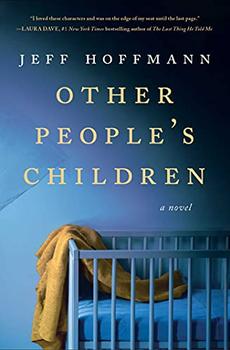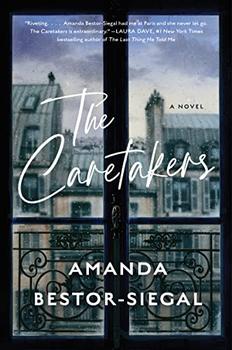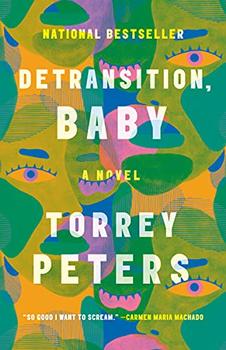Summary | Excerpt | Reading Guide | Reviews | Beyond the book | Read-Alikes | Genres & Themes | Author Bio

Gail and Jon long to start a family of their own. With news that Carli, a pregnant 18-year-old, has chosen them to adopt her baby, it seems that dream is finally about to become a reality. After bonding with Carli throughout the pregnancy and reveling in their first days as parents once the baby arrives, their bubble is quickly burst. Having not yet signed the form of Final Consent, Carli, spurred on by her domineering mother Marla, decides to reclaim custody. But with a string of miscarriages and failed adoption applications suffered en route to their newfound happiness, Gail and Jon are not prepared to give up the child without a fight.
The story is told from multiple perspectives: those of Gail, Jon, Carli, Marla, and Paige, the social worker assigned to oversee the adoption. This is a clever move on Hoffmann's part, allowing us to gain insight into each character's emotional turmoil. Being able to see such a fraught situation from different angles makes it practically impossible for us to take sides, as we can sympathize with all parties involved and better understand the moral complexities at play.
As events spiral and the characters find themselves drawn into a game of cat-and-mouse over custody of the child, the novel takes on a sense of tension and urgency, not unlike a thriller. Despite this shift towards heightened drama in the story's latter half, however, developments always feel pleasingly character-focused, with Hoffmann never losing sight of the huge emotional stakes. That said, if there is one character who would have benefitted from being fleshed out a little more, it's Marla. Positioned in many ways as the antagonist of the story, she can at times feel one-dimensionally cruel and unsympathetic. Occasional hints at greater depth are welcome, but go largely unexplored. Further knowledge of her past and motivations could have added significance and poignancy to her role within the narrative.
Given the stress being universally endured by the characters, reliance on coping mechanisms is a recurring thread that stands out as particularly effective. From seemingly harmless habits like obsessive list-making, escapism through music and dedication to study, to more toxic crutches like alcohol and violence, Hoffmann shows that we all have weaknesses, regardless of background. In each case, the author demonstrates the need his characters feel to vent their frustrations, but it is also clear that some habits are more dangerous and difficult to break than others, resulting in a cycle of self-destruction with ripple effects that are felt through both families.
Handling the conclusion of a novel that could never realistically bring about a happy ending for all its characters is tricky, but Hoffmann succeeds admirably. Suitably bittersweet, he provides a sense of closure for each of the main players, while avoiding the trap of trying to tie everything up too neatly, which can often diminish the impact of an otherwise complex narrative setup. Instead, he makes clear that much healing is yet to be done beyond the turn of the final page, while offering a glimmer of hope that this will indeed be possible.
Many novels have attempted to navigate the thorny issues of nature versus nurture and what it truly means to be a good parent, but Hoffmann's take feels fresh and contemporary. Resonant on a thematic level with the momentum of a page-turner, Other People's Children blends the best qualities of a literary thriller with the emotion of a character drama. It's the kind of novel that begs to be discussed with fellow readers by posing the ultimate question: What would you do?
![]() This review was originally published in The BookBrowse Review in May 2021, and has been updated for the
April 2022 edition.
Click here to go to this issue.
This review was originally published in The BookBrowse Review in May 2021, and has been updated for the
April 2022 edition.
Click here to go to this issue.

If you liked Other People's Children, try these:

by Amanda Bestor-Siegal
Published 2023
Set in a wealthy Parisian suburb, an emotionally riveting debut told from the point of view of six women, and centered around a group of au pairs, one of whom is arrested after a sudden and suspicious tragedy strikes her host family - a dramatic exploration of identity, class, and caregiving from a profoundly talented new writer.

by Torrey Peters
Published 2021
Reese almost had it all: a loving relationship with Amy, an apartment in New York City, a job she didn't hate. She had scraped together what previous generations of trans women could only dream of: a life of mundane, bourgeois comforts. The only thing missing was a child.
Your guide toexceptional books
BookBrowse seeks out and recommends the best in contemporary fiction and nonfiction—books that not only engage and entertain but also deepen our understanding of ourselves and the world around us.